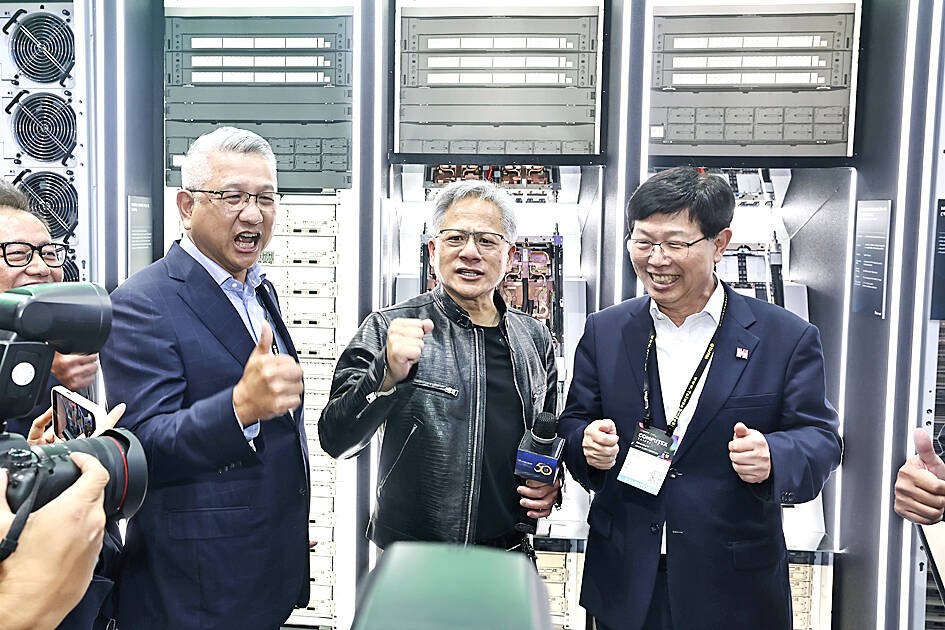Hon Hai Precision Industry Co (鴻海精密) yesterday announced that it plans to team up with Nvidia Corp to build an advanced computing center at the Kaohsiung Software Park (高雄軟體園區), with the US chip giant’s GB200 flagship chips at its core.
The computing center is to house artificial intelligence (AI) servers based on Nvidia’s latest AI chip — consisting of a total of 64 racks and 4,608 graphics processing units (GPUs), Hon Hai said.
Construction of the center is slated for completion by 2026, it added.

Photo: Fang Wei-chieh, Taipei Times
Through the latest collaboration, Hon Hai is banking on Nvidia’s AI technology to drive the development of its three smart platforms — smart manufacturing, smart electric vehicles (EV) and smart cities, Hon Hai said in a statement.
“Both companies will continue to deepen cooperation in AI, electric vehicles, smart factories, robots, smart cities and other fields, and demonstrate the strong competitiveness brought by AI through Foxconn’s huge manufacturing scale,” said the firm, which is Apple Inc’s largest contract manufacturer and is known as Foxconn Technology Group (富士康科技集團) internationally.
Hon Hai did not elaborate on how much it plans to invest in the center.
The company’s announcement came as Nvidia CEO Jensen Huang (黃仁勳) and Hon Hai chairman Young Liu (劉揚偉) met yesterday at a booth at Computex Taipei.
The booth belongs to Ingrasys Technology Inc (鴻佰科技), a Hon Hai subsidiary that makes Nvidia’s GB200 NVL72, a next-generation AI liquid-cooled rack solution and other Nvidia server products.
By leveraging Nvidia’s Omniverse and Isaac robotics platforms, coupled with Hon Hai’s image recognition technology and autonomous mobile robots, the company hopes to optimize its capacity utilization of AI server and EV production lines in Kaohsiung, it said.
In addition, Foxtron Vehicle Technologies Co’s (鴻華先進) new automotive manufacturing facilities in Kaohsiung’s Ciaotou District (橋頭) would become one of the group’s benchmark AI factories, it added.
Foxtron is an EV joint venture between Hon Hai and Yulon Motor Co (裕隆汽車). The new Ciaotou plant, which is under construction, is to use digital twin technology to achieve greater collaboration between virtual and physical production lines, as Foxtron is seeing electric bus orders outpace its current capacity, it said.
Upon the completion of the advanced computing center, the two companies will work with partners in the ecosystem to make generative AI applications a reality and help turn Kaohsiung into a smart city that would feature not just smart public transportation management, but also next-generation digital governance and medical health infused with generative AI technology, Hon Hai said.

SEMICONDUCTORS: The German laser and plasma generator company will expand its local services as its specialized offerings support Taiwan’s semiconductor industries Trumpf SE + Co KG, a global leader in supplying laser technology and plasma generators used in chip production, is expanding its investments in Taiwan in an effort to deeply integrate into the global semiconductor supply chain in the pursuit of growth. The company, headquartered in Ditzingen, Germany, has invested significantly in a newly inaugurated regional technical center for plasma generators in Taoyuan, its latest expansion in Taiwan after being engaged in various industries for more than 25 years. The center, the first of its kind Trumpf built outside Germany, aims to serve customers from Taiwan, Japan, Southeast Asia and South Korea,

Gasoline and diesel prices at domestic fuel stations are to fall NT$0.2 per liter this week, down for a second consecutive week, CPC Corp, Taiwan (台灣中油) and Formosa Petrochemical Corp (台塑石化) announced yesterday. Effective today, gasoline prices at CPC and Formosa stations are to drop to NT$26.4, NT$27.9 and NT$29.9 per liter for 92, 95 and 98-octane unleaded gasoline respectively, the companies said in separate statements. The price of premium diesel is to fall to NT$24.8 per liter at CPC stations and NT$24.6 at Formosa pumps, they said. The price adjustments came even as international crude oil prices rose last week, as traders

Taiwan Semiconductor Manufacturing Co (TSMC, 台積電), which supplies advanced chips to Nvidia Corp and Apple Inc, yesterday reported NT$1.046 trillion (US$33.1 billion) in revenue for last quarter, driven by constantly strong demand for artificial intelligence (AI) chips, falling in the upper end of its forecast. Based on TSMC’s financial guidance, revenue would expand about 22 percent sequentially to the range from US$32.2 billion to US$33.4 billion during the final quarter of 2024, it told investors in October last year. Last year in total, revenue jumped 31.61 percent to NT$3.81 trillion, compared with NT$2.89 trillion generated in the year before, according to

PRECEDENTED TIMES: In news that surely does not shock, AI and tech exports drove a banner for exports last year as Taiwan’s economic growth experienced a flood tide Taiwan’s exports delivered a blockbuster finish to last year with last month’s shipments rising at the second-highest pace on record as demand for artificial intelligence (AI) hardware and advanced computing remained strong, the Ministry of Finance said yesterday. Exports surged 43.4 percent from a year earlier to US$62.48 billion last month, extending growth to 26 consecutive months. Imports climbed 14.9 percent to US$43.04 billion, the second-highest monthly level historically, resulting in a trade surplus of US$19.43 billion — more than double that of the year before. Department of Statistics Director-General Beatrice Tsai (蔡美娜) described the performance as “surprisingly outstanding,” forecasting export growth